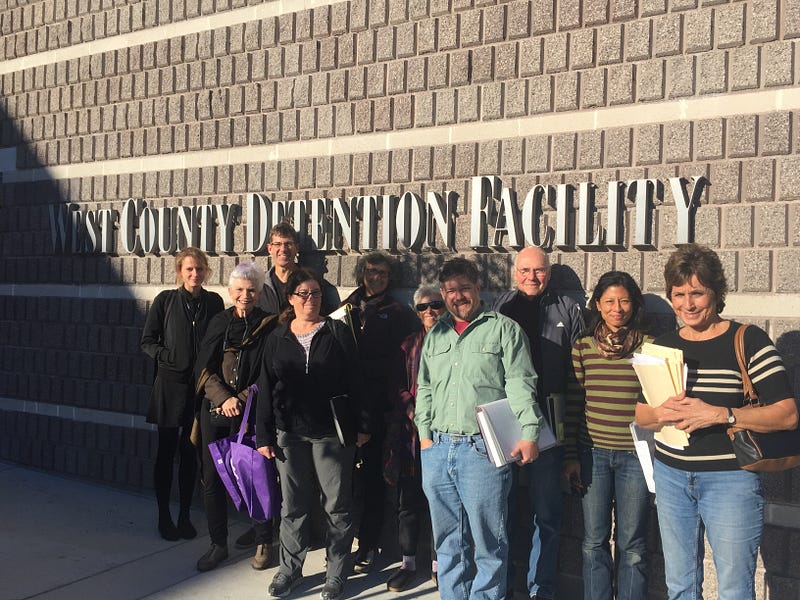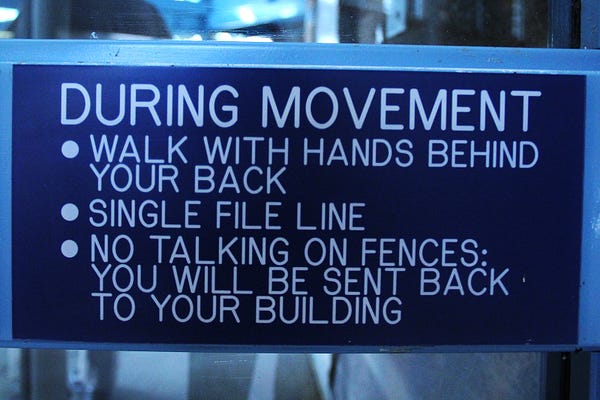by Cindy Knoebel

For the past year, a committed group of volunteers — led by CIVIC’s Rebecca Merton — has been visiting detained men and women at Richmond’s West County Detention Facility (WCDF). Recently, Rebecca, together with volunteers Judith Stacey, Janet Newman and Ann Smock, shared their experiences with CIVIC volunteer Cindy Knoebel
Here’s what they’ve seen — and learned.
Cindy Knoebel: Rebecca, what inspired you to lead this visitation program?
REBECCA MERTON: I’m inspired by the goal to abolish immigration detention while supporting the organizing and power-building initiatives of directly impacted people. That’s what CIVIC — Community Initiatives for Visiting Immigrants in Detention — is dedicated to.
CK: Janet, Ann and Judith: Why did you decide to become part of the WCDF visitation program?
JANET: I was involved with People Power, the ACLU grassroots movement working to create sanctuary cities, when I heard another volunteer, Rodrigo Torres, speak about the program. I was attracted to joining because it felt like a concrete way to make a difference for those people who have been most impacted by the terrible policies of this administration.
ANN: I signed up as a volunteer for two main reasons. One was that of all the nightmares caused by the Trump administration, the ban on refugees and immigrants and the free rein and encouragement given to ICE agents to round people up and detain them, causes me the most unhappiness. I used to teach French literature and culture, and several times gave courses on the German occupation of France. So the round-up of people considered aliens is a particularly vivid and horrible picture to me.
JUDITH: I’ve observed immigration court hearings in San Francisco, and that moved me to want to become more directly involved in hands-on immigration support work. I wanted to have a much deeper understanding of this deeply unjust system in order to challenge it more effectively.
CK: What have you come to realize about our country’s detention system as a result of your visits?
JANET: The conditions are appalling. The pettiness of the restrictions is mind- boggling. And the hypocrisy of the police and sheriff is astounding — claiming to not cooperate with ICE when we see all the time that people are picked up directly from the jails. The stories the women have told, of being locked in cells for hours at a time, having to ask permission to go to the bathroom, having access to very few activities and being served lousy food, are all shocking.
JUDITH: Although I expected to find injustice, racism and poor conditions in the system, I was unprepared for the petty level of authoritarianism, financial exploitation, and the irrationality and plain mean-spiritedness of the bureaucratic regulations and policies.
REBECCA: There’s finally now more media attention regarding the abuses within privately operated immigrant prisons, and rightfully so. That being said, every time we visit WCDF, it’s readily apparent that ICE funds and delegates authority to local jails in addition to private prisons as part of their overall strategy to cut costs and pass the buck on human rights violations.
CK: What has shocked and/or surprised you most during your visits?
ANN: So far, the sight that has shocked me most at WCDF is mild, I believe, by comparison with other aspects of the conditions endured by the detained people. But it has shaken me quite a bit. It is the utter contempt shown to the detained people by the deputies, who herd them in and out, refer to them as male and female “feds,” snatch the smallest paper from them and interrupt them in mid-sentence when visitation time is up. No doubt it shows how sheltered my own life has been, but I do not think I have seen before human beings routinely and casually treating other human beings like livestock.
JUDITH: The willful impediments to communication are particularly stunning. Our visits take place on the opposite side of a glass wall using telephones. We have no direct physical contact or access to detainees. Nonetheless, we are not allowed to bring anything with us but papers and small golf pencils. We cannot bring a pen or even a pencil of our own. Much worse, detained people are not allowed to bring anything to the visits. They cannot write down any information we provide and cannot bring along any of their documents to show us. We cannot deliver, receive, exchange any documents or anything else during these visits even though two guards sit at a station doing nothing the whole time.
The “smartmail/smart deposit” system for sending email and depositing money in commissary accounts is a shocking rip-off. We have to establish an account with a commercial system using our credit card. To send an email costs $1.10. A $2.95 fee is added to any cash deposit we wish to make to a commissary account. The emails we send must first be reviewed by prison censors before they are printed out and delivered to the detainees, who are then not allowed to reply via email.
CK: Are there a couple men and/or women whose stories you’ve found particularly heartbreaking?
REBECCA: Carmen (not her real name) has severe anemia. Every few years she requires a blood transfusion. She requested medical attention upon entering ICE detention, but was completely ignored. Whenever she asked for a medical appointment by calling the appropriate phone extension, the person who answers the line humiliated her by replying that she does not speak Spanish and hanging up.

Quote from Carmen: “For all this time since I’ve been detained, I’ve asked for medical attention and they don’t pay attention to me. The truth is I don’t know why they treat me like this. If I’m asking for medical attention it’s because I need it. Many of my compañeras have had much worse things happen by not receiving medical attention in time when they most need it. It’s the saddest thing I’ve experienced, not knowing how to defend myself and what my rights are. Many of us have remained silent out of fear of being deported. It’s a great injustice what they’re doing to us for being a migrant in this country.”
JUDITH: Right now I’m most involved with Ana (not her real name), a 29 year-old woman whose mother brought her to the US from Mexico when she was approximately 13. Ana has four US-born children, now between the ages of 6–12, who are living with their paternal grandmother in L.A. She has not seen her children for more than 2 years. I first met Ana in September, one month after she had abdominal surgery to remove a tumor, which I hope/believe was benign. She was in pain and showed me an ominous swelling at the incision site, but has not received adequate follow-up care or pain management medication. She describes appalling conditions and hostile treatment at the facility, such as restrictions on access to toilets that the media has covered, and excessive time confined to cells. Recently, she and everyone else I visited said they’d been served spoiled milk and green, moldy bread. Ana joined a group of women who signed a grievance about their treatment, and she claims the guards have retaliated in hostile ways.
One story that really shocked me: A woman whose husband falsely accused her of domestic violence was picked up by the police and held in Santa Rita for a week. She was then picked up by ICE from Santa Rita and ended up here even though she has been working legally (her husband is a citizen and she was working toward her green card). She has a 12 year-old disabled daughter who gets seizures. The daughter was put into Child Protective Services (her husband is not the father). She was completely devastated and worried about her daughter. Fortunately she was able to get out on bond after a few weeks, but there is no reason that she should have been detained in the first place.
CK: What would you like our readers to know about the work you do — and the people you’ve met?
JUDITH: That everyone we visit is a civil detainee being caged, demeaned, ill-treated, and exiled from their families and communities only because they are undocumented immigrants. They are treated as if they are serving a criminal sentence but they do not even have a right to legal counsel. Some are asylum seekers. Many of the confined people I’ve met are parents of US citizens. Taxpayers are footing an enormous bill to destroy families and lives while receiving no benefits whatsoever.
JANET: I would like people to understand that even though we think that by creating sanctuary cities we have created safe places for people, we have not. We do not have enough accountability from the police and sheriff’s departments. Most of the people detained are hard-working, decent people, and what we are doing is shocking and inhumane.
REBECCA: I think it’s important for the wider public to understand that the immigration detention system is built upon a long history of racism and capitalism and intentionally functions to suppress the power of marginalized communities. Abusive conditions are not staff or facility or contract deficiencies; they are symptoms of an eliminationist system functioning exactly as it was designed to.

